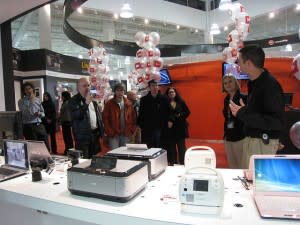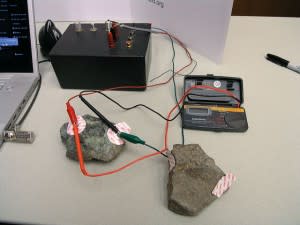Tech Products: Why Not to Buy Early
Electronics companies love lighthouse customers. They’re the ones who can be counted on to buy anything, provided it’s new. They’re also the ones who end up making angry Youtube videos, after accumulating tons of hysterically failed products. Virtual Boy, PSP Gos, anything made by Apple in the 90′s, you name it. While it may be fun to play “early adopter” and buy tech products early, the pay-off is seldom worth it. Here’s why:

"I don't care if it's just a cardboard mock-up, you sell it to me!"
1. You Pay For First Failures
No disrespect to skydivers, but the first person to buy and use a parachute was probably an idiot. Brave, but an idiot. The same principle applies to buying tech products early: If it doesn’t work, you’re the first to pay for it. Later adopters will thank you, but thanks never replaced wasted money.
Just wait a month or two, you’ll have access to hundreds of reviews. Then you can decide if the product matches the advertising, or if the company’s marketing crew should be reported for whatever they’re smoking. Remember that in most companies, the sales and tech teams mix like oil firms and hippies.
Also, the manufacturer will probably have bugs to fix, and you’ll want the smooth, working version. Remember Apple’s iPhone 4? The phone had connection issues, and it was the first batch of buyers that paid for it. Consumers who waited a month or two got the better end of the deal.

"In theory, it makes you immune to falling damage from cliffs. Buy one and tell us how it goes!"
2. You Have Fewer Alternatives
When a product has been on the market a while, alternative versions appear. Because what else is China for? But apart from cheap clones, you’ll also find devices that improve on the original.
Think of poor old Magnavox, one of world’s first console games companies. What, you’ve never heard of them? Oh that’s right, they got totally demolished by the hordes of imitators. Rival companies started to provide viable, improved alternatives to their product. Which was great for consumers…at least the ones who waited.
When you buy early, you’re a consumer with few choices. The newer the device, the fewer the alternatives. If you want to make your money count, you should wait for the market to catch up. Then choose from a range of options, which may be better suited to you.

Shut up, my point holds. Wait long enough and there WILL be alternatives damn it.
3. The Price Will Drop
There are exceptions, but most electronics drop quickly in price. It’s related to point 2: As alternatives appear and demand drops, the price tag will follow.
Retailers also participate in this. As more people buy the product, the retailers get a sense of consumer needs. That’s when you get package deals; like iPads that come with free casings, or microwave pizza that comes with free vomit bags. These package deals can end up saving you quite a bit. But buy new, and you’ll probably be buying every accessory separately.
If the device has a 3G connection, you should also wait for service providers to launch promotions. Local telcos usually subsidise the cost of tablets and phones, since they make their money off the line. Even if you don’t end up taking their offer, at least wait to compare them.

"Oh Netbooks? We moved them to the discount 'doorstops & paperweights' section."
4. Early Obsolescence Risk
Sometimes, you’ll see products that are new and original. Things that no one’s made before. And sometimes, that’s because the product is so meaningless, or the market so small, that it will never be profitable.
Case in point: The PSP Go. The PSP Go was released because…hell I don’t know, someone at Sony needed a new Volkswagen or something. But it was released, hung around for a mayfly’s lifespan, then was replaced by the PSP Vita. The early buyers got squat out of it. But there are worse disasters: Betamax video, the 8 track, and the Virtual Boy to name a few.
When you buy early, you risk buying into something that may not take off. If the product doesn’t sell, the manufacturer pulls the plug. That means no more firmware upgrades and support. You’ve effectively bought a plastic brick with a lot of wires.

"PSP Go? I recommend something with a longer lifespan. Like some fresh fruit."
5. Wait for Supporting Products / Apps
Back in the 90′s, you would have been laughed out the store if you bought a processor faster than 99 MHz. And for good reason: There was nothing that required it. By the time it was essential to upgrade, the 99 MHz processors had dropped considerably in price (see point 3). The benefits for the early buyers? Nothing beyond (temporary) bragging rights.
Same goes for devices like new format DVD readers, game consoles, and video cards. When you’re buying them, stop and ponder why exactly you need them. Are there actually a lot of useful applications that require them? If not, take it easy. You may not even like the apps eventually developed for that new toy.

"They should call this the iPad 3. Because that's the number of apps that need it."
Image Credits:
mastermaq, jm3, jeffwilcox, See Modern Britain, the italian voice, daveynin, jamesbastow
Do you buy tech products early? Comment and tell us why!
Get more Personal Finance tips and tricks on www.MoneySmart.sg
Click to Compare Singapore Home Loans, Car Insurance and Credit Cards on our other sites.
More From MoneySmart

